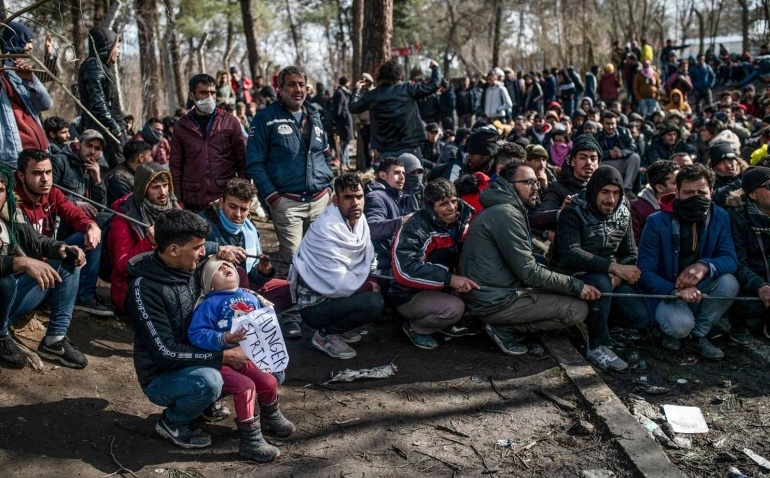Syrian refugees at the Greek border near the Pazarkule crossing, Edirne, Turkey, March 5, 2020 (AFP)
Turkish President Recep Tayyip Erdoğan will visit European Union headquarters in Brussels, Belgium on Monday, as he shifts his attention from Russian-Assad regime military operations to Syria’s refugees in Turkey.
Speaking at an International Women’s Day ceremony in Istanbul on Sunday, Erdoğan said little about the discussions, declaring vaguely, “I hope I will return from Belgium with different outcomes.”
Instead, he focused on Greece, which is blocking Ankara’s encouragement of refugees to exit into the EU: “No one raises their voice against Greece’s inhumane treatment of asylum seekers.”
Turkey hosts 3.6 million Syrian refugees, but closed its border in 2016 to further entries.
Pressure has built up on Ankara with the Russian-regime offensive, which began late April, seizing almost all of northern Hama Province and part of southern Idlib Province in northwest Syria.
The attacks have displaced more than 1 million civilians towards the Turkish border, as well as killing almost 2,000 and wounding thousands.
See also The Reality of Syria: No One “Wins”
Last month, Turkey pushed back with attacks on pro-Assad unit as Erdoğan demanded the withdrawal of regime forces from Idlib by February 29. However, in the face of Russia’s refusal to give way, the Turkish President agreed with Russian counterpart Vladimir Putin last Thursday on a ceasefire and a partition of Idlib.
Erdoğan, who then spoke with German Chancellor Angela Merkel, claimed on Sunday that no one was paying attention to a “great majority” of women and children among the more than 1 million displaced. He said Greek authorities were firing on refugees and trying to sink their boats.
Retreating from A Russian Showdown
However, even as the President was speaking, he took another step back. Erdoğan ordered the Turkish coastguard to reverse course and stop refugee attempts from crossing the Aegean Sea crossings “because it is dangerous”.
Ankara said more than 1,700 “migrants” — a significant change from its usual language of “refugees” — landed on Lesbos and four other Aegean islands in the past week.
In March 2016, the European Union reached an agreement with Turkey to prevent refugees moving into the EU, pledging 3 million Euros to Ankara for support of its hosting of the displaced. Turkish officials complain that the terms of the deal have not been fulfilled.
Erdoğan insisted that Turkey “reserves the right to clear the [Idlib] area” if Russia and other countries failed to uphold the ceasefire.
But he indicated that Ankara would not push back the pro-Assad forces who have seized half of Idlib, trapping the displaced.
“Our only goal is to facilitate the safe return of 3.6 million people already residing in our country and 1.5 million others from Idlib who approached our borders,” he said.
Turkish Defense Hulusi Akar said on Sunday that agreement has been reached on arrangements for joint Russian-Turkish patrols from March 15.
The patrols will be carried out along a 12-km (7.5-mile) corridor to the north and south of the cross-Idlib M4 highway.
The M5 highway, from Damascus to Aleppo, and the M4 were fully seized by the pro-Assad offensive last month. Days before the Erdoğan-Putin meeting last week, Russia enabled the pro-Assad forces — including Hezbollah fighters, Iranian-led foreign militia, and Russian mercenaries — to reoccupy the key town of Saraqib at the junction of the highways.

